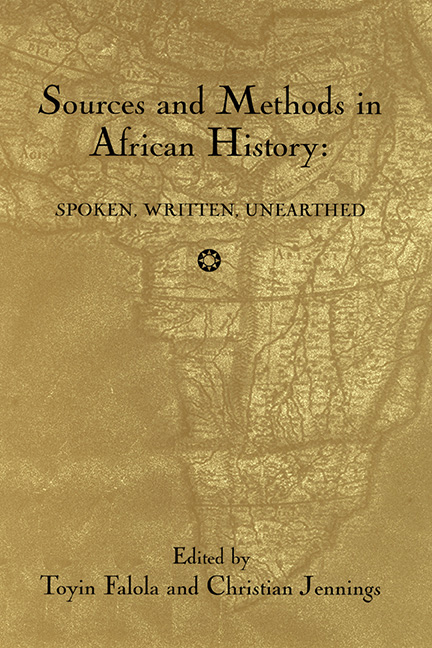Book contents
- Frontmatter
- Dedication
- Contents
- Acknowledgments
- Introduction
- Part I Archaeological Sources
- Part II Africa and the Atlantic World
- Part III Documentary Sources
- Part IV Oral Tradition
- Part V Innovative Sources and Methods
- 19 Section Introduction: Innovative Sources and Methods
- 20 Ben and Maggie: Consuming Data: Reassessing Scientific and Anthropological Evidence: Historical Perspective on Nutrition Studies
- 21 Electricity Networks in Africa: A Comparative Study, or How to Write Social History from Economic Sources
- 22 “Rain or Shine We Gonna' Rock”: Dance Subcultures and Identity Construction in Accra, Ghana
- 23 Sample Surveys: Underexploited Sources for African Social History
- Contributors
- Index
22 - “Rain or Shine We Gonna' Rock”: Dance Subcultures and Identity Construction in Accra, Ghana
from Part V - Innovative Sources and Methods
Published online by Cambridge University Press: 25 October 2017
- Frontmatter
- Dedication
- Contents
- Acknowledgments
- Introduction
- Part I Archaeological Sources
- Part II Africa and the Atlantic World
- Part III Documentary Sources
- Part IV Oral Tradition
- Part V Innovative Sources and Methods
- 19 Section Introduction: Innovative Sources and Methods
- 20 Ben and Maggie: Consuming Data: Reassessing Scientific and Anthropological Evidence: Historical Perspective on Nutrition Studies
- 21 Electricity Networks in Africa: A Comparative Study, or How to Write Social History from Economic Sources
- 22 “Rain or Shine We Gonna' Rock”: Dance Subcultures and Identity Construction in Accra, Ghana
- 23 Sample Surveys: Underexploited Sources for African Social History
- Contributors
- Index
Summary
This essay reconstructs the history of youth subcultures in Accra in the early independence era by examining how unique group identities emerged and how they were closely integrated with the creation, adoption, and adaptation— from both within and outside of the continent—of popular culture forms such as kpanlogo, highlife, and rock ‘n’ roll music. The creation of these subcultures was closely linked to their economic, political, and social environment, but it was also connected increasingly to an expanding global cultural system carried by changing technology and increased international mobility of people and ideas. Urban underclass youth successfully merged aspects of Western, diaspora, and African influences into new networks of association and created a new urban cultural milieu that both was a reflection of, and acted as an agent on, their changing identity constructs.
Subcultures, by definition, exist beneath the upper layer of society and, therefore, the references to them in traditional sources are scarce. In those instances where they do appear, the picture of them is more often than not skewed toward an image of “troublesome delinquents” and “social deviants” representing the decay of modern society. The Ghanaian historiography on urban history is limited; that of youth subcultures even more so. Recent works such as Claire Robertson's Sharing the Same Bowl (1984), Emmanuel Akyeampong's Drink, Power, Cultural Change (1996), and most recently, Jon Parker's Making the Town: Ga State and Society in Early Colonial Accra (2000) discuss various aspects of Accra history and have done much to expand our knowledge. Only Akyeampong, however, delves into issues of Accra underclass culture with his focus on the social history of drinking; still, he touches only cursorily on the existence of youth cultures.
Youth culture is essential to understanding the development of an urban environment. Johan Fornäs sees youth as “what belongs to the future,” and associates them with “what is new in culture.” In the African context, a large percentage of the population was (and is even more so today) younger than the age of twenty-five. A study of youth provides insights not only into the historical identity construction of urban society, new genres of popular culture, and their role in social reorganization, but it also contributes to a better understanding of variances in larger, global cultural trends, both past and present.
- Type
- Chapter
- Information
- Sources and Methods in African HistorySpoken Written Unearthed, pp. 361 - 375Publisher: Boydell & BrewerPrint publication year: 2003

